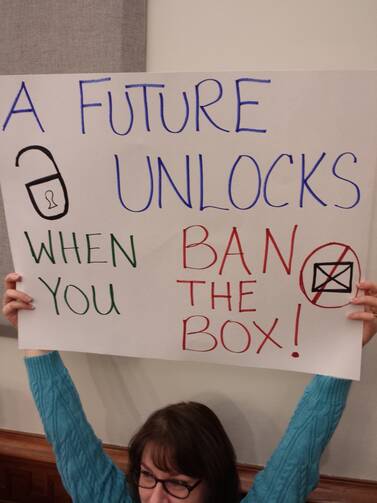I had worked in the factory alongside a lighthearted and funny family man about ten years my senior for perhaps three or four months before the topic came up. As a young man, he’d been part of a gang, and he and some peers were arrested after a fight. Some of them were armed, and they all ended up spending a few years in the state prison. He came out convinced that he didn’t want to go back and determined to straighten out his life.
He had the good fortune of doing so before “the box” became standard in employment applications. That’s the box on the first page you must check if you have ever been convicted of a felony. For many employers, a mark in the box means the application goes straight to the wastebasket.
If we want to rehabilitate ex-offenders, we must ensure they have opportunities to become productive, contributing members of society. That’s why, as the editors note in their Labor Day editorial, the quiet movement to “Ban the Box” is a sign of hope.
In August, Governor Chris Christie signed legislation making New Jersey the 13th state to “ban the box.” These laws, also multiplying at the city and county level, forbid the box as an employment screening procedure by public employers and sometimes private ones as well. They don’t forbid the use of criminal background checks entirely, but they do call on employers to wait until later in the process and to link the offense rationally to the job sought. A conviction for drug possession in one’s past might disqualify him or her from working in a pharmacy, but probably shouldn’t be an obstacle to waiting tables or data entry.
As of today, Ban the Box is far more familiar in the African-American community than elsewhere. And understandably so: tens of millions of Americans of all races use illicit drugs in their youth, but for a host of reasons, blacks are far more likely than whites to come away from the experience with a criminal record and perhaps prison time. Because of this, ban the box has taken on a bit of the character of a post-drug war civil rights movement.
But this is an opportune time for action on a national scale. In a pleasant departure from our tendency to make any public issue a source of partisan rancor, leaders of both political parties have expressed interest in tackling the problems created by mass incarceration, and are speaking with sensitivity about its disproportionate impact on the black community. Let’s come together to ban the box and ease the path of redemption for our neighbors. Surely the master who forgave his servant the debt of ten thousand talents (Matt 18:21-35) would expect no less.








